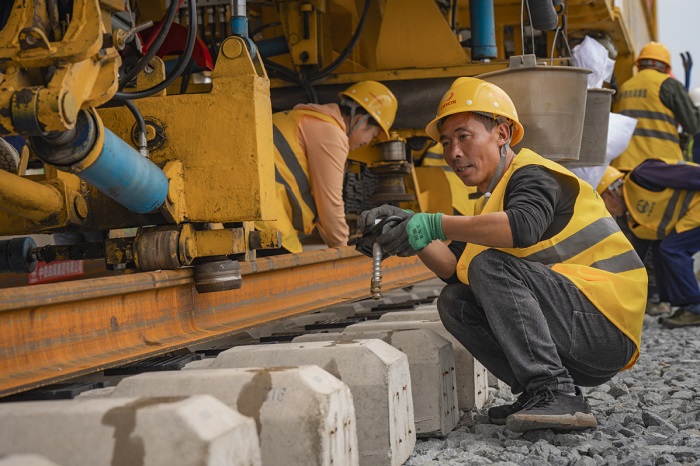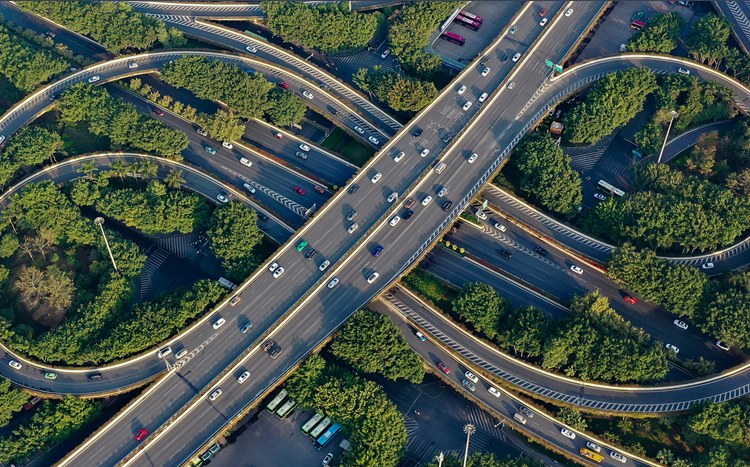New HSR in Guangxi to boost trade

CREC4 employees lay tracks on the Chongzuo-Pingxiang high-speed railway in the Guangxi Zhuang autonomous region on Monday. [ZHAO MENGTING/FOR CHINA DAILY]
Pingxiang, which borders Vietnam and is a county-level city under the prefecture-level city of Chongzuo in the Guangxi Zhuang autonomous region, is set to usher in a new high-speed railway to boost passenger flow and border trade.
The Chongzuo-Pingxiang HSR, part of the railway linking Pingxiang with Nanning, the regional capital, started to lay tracks on Monday on all its lines, said Lu Shen, manager of the track-laying project from State builder China Railway No 4 Engineering Group Co Ltd (CREC4).
The Chongzuo-Pingxiang railway, which is expected to be operational by the end of 2025, can be extended to Vietnam over the long run if conditions allow, Lu said.
As the third self-invested HSR in Guangxi, the Chongzuo-Pingxiang HSR runs in the east from Jiangzhou district under Chongzuo, traverses Chongzuo's Ningming and Longzhou counties in the west, and terminates at Pingxiang.
With four stations — Chongzuo South, Ningming East, Longzhou and Pingxiang East — on the 81.52-kilometer line, 85.63 percent of the Chongzuo-Pingxiang HSR will be railway bridges and tunnels, Lu said.
Earlier, the Nanning-Chongzuo section of the Nanning-Pingxiang HSR was opened to traffic in December 2022.
Upon operation of the Chongzuo-Pingxiang section, Nanning and Pingxiang can be connected fully by a high-speed railway and be reached within one hour, said Wu Huaiqiu, publicity chief of CREC4 Eighth Engineering Co Ltd.
Meanwhile, the western end of the entire line can link with Vietnam's Dong Dang-Hanoi railway via the railway between Hunan province and Guangxi, providing travelers with trips to as far as Vientiane in Laos, Bangkok in Thailand, Kuala Lumpur in Malaysia, and Singapore, he said.
Via the Nanning hub, the eastern end of the Chongzuo-Pingxiang HSR can join the existing Nanning-Guangzhou HSR, Liuzhou-Nanning Intercity Railway, Nanning-Kunming HSR and the Guiyang-Nanning HSR, which is under construction.
All these will help largely elevate the three-dimensional transport capacity of Guangxi in linking the country's eastern and western regions, and in connecting with ASEAN markets, Wu said.
Lu said that in order to ensure the smooth progress of track-laying construction, CREC4 builders work 24-hour shifts to ensure that the average track-laying is not less than 1.5 km per day, safeguarding the on-time full completion in terms of both quality and quantity.
Guangxi Communications Investment Group Corp Ltd, which invested in the Chongzuo-Pingxiang section, said the section had achieved full completion in terms of building roads, bridges and tunnels by mid-October, and now it is time for 165.75 km of track laying, including 159.51 km of tracks on the main line, and 6.24 km of tracks within railway stations.
Lu added that there will be 28 sets of turnouts, four sets of telescopic regulators and 628,200 cubic meters of ballast.














